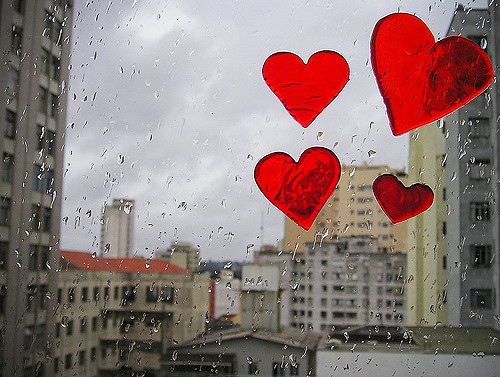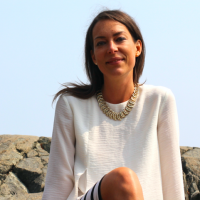I think I must be like one of those thin rain jackets they sell at the tourist shops downtown.
Not water-proof as they claim, however, but slightly water-resistant. Except in my case, it’s not the rain I am repelling—it’s love.
I realized today that I might actually be love-resistant.
This epiphany does not strike me as odd—I have been dragging my tail in the relationship sector for years.
I was happy this morning when the idea finally materialized, and I imagine some of my family members, friends and ex-partners would be as well.
Love-resistant.
This phenomena is so much easier to explain to people than the complex argument I usually produce of past hurts and childhood difficulties. I have just always been one of those people who gets the itches when things start feeling like they are “settling down” and whose body begins to brace itself at the onset of domestic routine.
Yes, this romance-repellent nature of mine was maybe something more than just random failed attempts at forever. It might be something I was born with, like a genetic pre-disposition.
I remember my mother telling me a story about my great-grandmother. She was a a tough woman—a homesteader with 13 children, a husband and a farm. One day she decided to run off and leave it all. She was probably a carrier of the love-resistant gene too.
We all have our strategies for dealing with life and love—mine has always been leaving.
I have left men, women, friends, cities, countries, continents and jobs to keep my repellent coating intact.
Before I realized my resistance could have been inherited, I noticed that my aversion to intimacy wasn’t what it appeared to be. It did not, in fact, originate as an organic keen ability to push others away. Underneath that—at the very beginning, before the pushing began—there was a decision that something about myself was too much to face. So I turned desperately away. This is probably what caused the initial mutation of my love gene.
I understand what triggered the growth of resistance in me. I wonder what it was that did it in my great-gran?
What I am most afraid of is heartbreak and of the possibility of being left—so instead, I turn into a porcupine. I shoot out sharp little quills in an attempt to protect my soft-bellied insides, those places in me that feel too fragile to be touched.
But the thing is—after a lifetime of doing this, I now want to change.
I want to allow some tender moisture in.
I would like to feel love close-up, against my skin.
I want to know its temperature and its true nature.
I want to know if I really will get broken.
I want to know if I would actually get left.
Because now I am older and a little more curious, and my heart is getting tired of being wrapped up in unbreathable, synthetic layers.
This morning—after coming up with my most perfect labels yet to explain my condition—I remembered how much I dislike labels. For my own evolution to continue, I must alter this gene.
I turn the magnifying glass back on myself. I take my hand and I place it on my belly, and I begin with this first step.
I touch, with softness, one of my most tender places—and I allow myself to feel.
There is a promise I make to myself too—that I will work with my love-resistance in my outer world. I will practice staying more, instead of leaving. I will try to hold my space, and let the emotional weather soak in a bit, when the urge to repel takes hold.
Removing my “love-jacket” will be vulnerable and revealing work—but the idea of walking around forever with a barrier up between myself and one of my biggest desires seems a bit ironic.
I will make a plan to trade in my love apparel this winter, and none of my new gear will be resistant from much, except maybe the cold. However, I will allow myself to keep a small umbrella with me—in case of an emergency love-sheltering need. I realize it is important to take big steps like this slowly.
I have been reading about the human ability to change our genetic coding through intention and action. My potential for hereditary transformation seems good. I hope the statistics are correct, because someday I plan to pass on a gene called the love-sponge.
This work is for future generations, not just for me. I want others to have the opportunity to adopt a body that is naturally wired for softness, affection and—yes, love.
.
Author: Sarah Norrad
Editor: Yoli Ramazzina
Photo: Flickr/tainara







Read 2 comments and reply